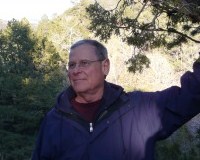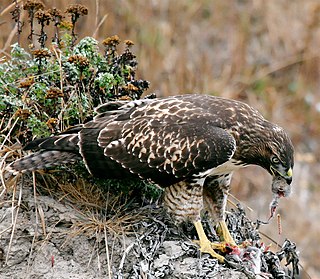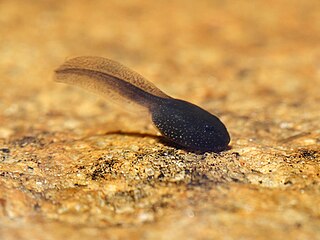
Wildlife refers to undomesticated animal species, but has come to include all organisms that grow or live wild in an area without being introduced by humans. Wildlife was also synonymous to game: those birds and mammals that were hunted for sport. Wildlife can be found in all ecosystems. Deserts, plains, grasslands, woodlands, forests, and other areas including the most developed urban areas, all have distinct forms of wildlife. While the term in popular culture usually refers to animals that are untouched by human factors, most scientists agree that much wildlife is affected by human activities. Some wildlife threaten human safety, health, property and quality of life. However, many wild animals, even the dangerous ones, have value to human beings. This value might be economic, educational, or emotional in nature.
In environmental philosophy, environmental ethics is an established field of practical philosophy "which reconstructs the essential types of argumentation that can be made for protecting natural entities and the sustainable use of natural resources." The main competing paradigms are anthropocentrism, physiocentrism, and theocentrism. Environmental ethics exerts influence on a large range of disciplines including environmental law, environmental sociology, ecotheology, ecological economics, ecology and environmental geography.
A land ethic is a philosophy or theoretical framework about how, ethically, humans should regard the land. The term was coined by Aldo Leopold (1887–1948) in his A Sand County Almanac (1949), a classic text of the environmental movement. There he argues that there is a critical need for a "new ethic", an "ethic dealing with human's relation to land and to the animals and plants which grow upon it".

David Pearce is a British transhumanist philosopher. He is the co-founder of the World Transhumanist Association, currently rebranded and incorporated as Humanity+. Pearce approaches ethical issues from a lexical negative utilitarian perspective.
This index of ethics articles puts articles relevant to well-known ethical debates and decisions in one place - including practical problems long known in philosophy, and the more abstract subjects in law, politics, and some professions and sciences. It lists also those core concepts essential to understanding ethics as applied in various religions, some movements derived from religions, and religions discussed as if they were a theory of ethics making no special claim to divine status.

Mary Beatrice Midgley was a British philosopher. A senior lecturer in philosophy at Newcastle University, she was known for her work on science, ethics and animal rights. She wrote her first book, Beast and Man (1978), when she was in her late fifties, and went on to write over 15 more, including Animals and Why They Matter (1983), Wickedness (1984), The Ethical Primate (1994), Evolution as a Religion (1985), and Science as Salvation (1992). She was awarded honorary doctorates by Durham and Newcastle universities. Her autobiography, The Owl of Minerva, was published in 2005.

Tom Regan was an American philosopher who specialized in animal rights theory. He was professor emeritus of philosophy at North Carolina State University, where he had taught from 1967 until his retirement in 2001.

J. Baird Callicott is an American philosopher whose work has been at the forefront of the new field of environmental philosophy and ethics. He is a University Distinguished Research Professor and a member of the Department of Philosophy and Religion Studies and the Institute of Applied Sciences at the University of North Texas. Callicott held the position of Professor of Philosophy and Natural Resources at the University of Wisconsin–Stevens Point from 1969 to 1995, where he taught the world's first course in environmental ethics in 1971. From 1994 to 2000, he served as vice president then president of the International Society for Environmental Ethics. Other distinguished positions include visiting professor of philosophy at Yale University; the University of California, Santa Barbara; the University of Hawaiʻi; and the University of Florida.

Stephen Richard Lyster Clark is an English philosopher and professor emeritus of philosophy at the University of Liverpool. Clark specialises in the philosophy of religion and animal rights, writing from a philosophical position that might broadly be described as Christian Platonist. He is the author of twenty books, including The Moral Status of Animals (1977), The Nature of the Beast (1982), Animals and Their Moral Standing (1997), G.K. Chesterton (2006), Philosophical Futures (2011), and Ancient Mediterranean Philosophy (2012), as well as 77 scholarly articles, and chapters in another 109 books. He is a former editor-in-chief of the Journal of Applied Philosophy (1990–2001).
Paul W. Taylor was an American philosopher best known for his work in the field of environmental ethics.
Robert Frodeman is former Professor and former Chair, Dept of Philosophy and Religion, University of North Texas, previously at the University of Colorado, and Director of UNT's Center for the Study of Interdisciplinarity. He publishes in the philosophy of geology, the philosophy of interdisciplinarity, and practical philosophy. Frodeman is now a writer and consultant living in Hoback, Wyoming.

David Abram is an American ecologist and philosopher best known for his work bridging the philosophical tradition of phenomenology with environmental and ecological issues. He is the author of Becoming Animal: An Earthly Cosmology (2010) and The Spell of the Sensuous: Perception and Language in a More-than-Human World (1996), for which he received the Lannan Literary Award for Nonfiction. Abram is founder and creative director of the Alliance for Wild Ethics (AWE); his essays on the cultural causes and consequences of ecological disarray have appeared often in such journals as the online magazine Emergence, Orion, Environmental Ethics, Parabola, Tikkun and The Ecologist, as well as in numerous academic anthologies.
Biocentrism, in a political and ecological sense, as well as literally, is an ethical point of view that extends inherent value to all living things. It is an understanding of how the earth works, particularly as it relates to its biosphere or biodiversity. It stands in contrast to anthropocentrism, which centers on the value of humans. The related ecocentrism extends inherent value to the whole of nature.

Wild animal suffering is the suffering experienced by non-human animals living outside of direct human control due to harms, such as disease, injury, parasitism, starvation and malnutrition, dehydration, weather conditions, natural disasters, and killings by other animals, as well as psychological stress. Some estimates indicate that these individual animals make up the vast majority of animals in existence. An extensive amount of natural suffering has been described as an unavoidable consequence of Darwinian evolution, as well as the pervasiveness of reproductive strategies, which favor producing large numbers of offspring, with a low amount of parental care and of which only a small number survive to adulthood, the rest dying in painful ways, has led some to argue that suffering dominates happiness in nature.
Dale Jamieson is Professor of Environmental Studies and Philosophy at New York University, a scholar of environmental ethics and animal rights, and an analyst of climate change discourse. He also serves as a faculty affiliate for the NYU School of Law and as director of NYU's Animal Studies Initiative, which was funded by Brad Goldberg with a $1 million donation in 2010. In addition to his affiliation with the NYU Departments of Environmental Studies and Philosophy, Jamieson also holds positions at The Dickson Poon School of Law and at the University of the Sunshine Coast in Australia.
Clare Palmer is a British philosopher, theologian and scholar of environmental and religious studies. She is known for her work on environmental and animal ethics. She was appointed as a professor in the Department of Philosophy at Texas A&M University in 2010. She had previously held academic appointments at the Universities of Greenwich, Stirling, and Lancaster in the United Kingdom, and Washington University in St. Louis in the United States, among others.

The predation problem or predation argument refers to the consideration of the harms experienced by animals due to predation as a moral problem, that humans may or may not have an obligation to work towards preventing. Discourse on this topic has, by and large, been held within the disciplines of animal and environmental ethics. The issue has particularly been discussed in relation to animal rights and wild animal suffering. Some critics have considered an obligation to prevent predation as untenable or absurd and have used the position as a reductio ad absurdum to reject the concept of animal rights altogether. Others have criticized any obligation implied by the animal rights position as environmentally harmful.

The relationship between animal ethics and environmental ethics concerns the differing ethical consideration of individual nonhuman animals—particularly those living in spaces outside of direct human control—and conceptual entities such as species, populations and ecosystems. The intersection of these two fields is a prominent component of vegan discourse.
Thomas Lepeltier is a French independent scholar, essayist and science writer specializing in the history and philosophy of science and applied ethics, known in particular for his contributions to the field of animal law. He is the author of several philosophical works on animal ethics such as L'imposture intellectuelle des carnivores and of science history books including Darwin hérétique and Univers parallèles. Known initially as a science historian, he now mainly advocates in defense of animals in the French media.










